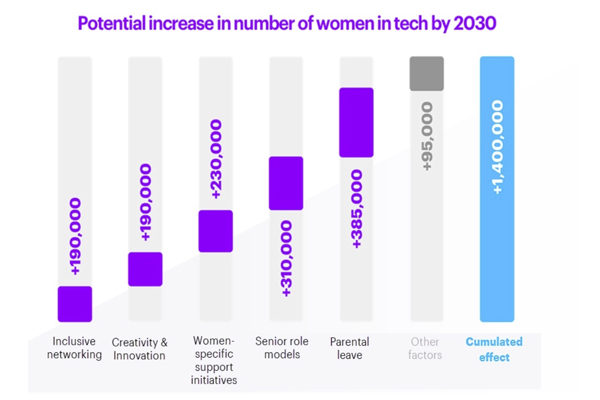Around 50% women abandon tech careers by the age of 35, according to new research from Accenture and Girls Who Code. Despite efforts made in recent years to encourage more women to pursue tech careers, the gender imbalance is actually worse than it was 35 years ago. In fact, 35% of women worked in tech in 1984 compared to just 32% today.
The joint research, Resetting Tech Culture, also revealed women leave tech roles at a 45% higher rate than men. In addition, just 16% of engineering roles and only 27% of computing roles are held by women (in the US). The research attributes the widening gender imbalance mostly to college/university and work cultures simply not being inclusive enough for women (37%).
It’s not the “subjects or skills themselves, but the environments that women find themselves in” during/after training, notes the study. In fact, there’s actually a huge disconnect between HR leaders’ company expectations and what women actually experience in their roles. While 45% of senior HR leaders say that it’s easy for women to thrive in tech, only 21% of women agree. That number falls to just 8% for women of colour.

Image credit: Christina Morilla, Pexels
RETAINING WOMEN IN TECH
“Factors such as a lack of personal support, visible female leadership and workplace policies such as shared parental leave all mean that, by the age of 35, women are unfortunately more likely to abandon their technology careers,” according to Zahra Bahrololoumi, UK & Ireland Technology Lead at Accenture.
She believes the key to retaining female talent in technology roles is to create an inclusive workplace culture. “It’s important that we make this a key focus so that years of progress are not undone. We need bold leadership and comprehensive action to help tech women succeed in the workplace,” pointed out Bahrololoumi. “Truly inclusive organisations allow for women in technology to thrive, to feel empowered to make decisions and to feel their voices will be heard.”

Kathryn Ross, Global Open Innovation Lead and the Black Founders Development Program Lead for Accenture Ventures, agrees. “Our research over the past three years identifies three key factors for an inclusive culture: bold leadership, comprehensive action and an empowering environment. The stronger the focus in these areas, the more likely women are to thrive,” explained Ross. Creating inclusive colleges and organisations is a winning strategy to improve women’s retention and advancement in technology.”
INCLUSIVE CULTURE IS KEY
Interestingly, the research found that if every firm scored highly on inclusive culture measures, the annual attrition rate of women in tech would drop by 70%. Both Accenture and Girls Who Code believe inclusion holds the potential to double their number over the next decade. So they have identified tangible steps for organisations to help retain women in tech.

Source: Resetting Tech Culture
Adopting just five practices could help retain about 1.4 million women in tech roles by 2030, according to the study. In addition, the probability of women in tech advancing in their careers would also shoot up by 77%.
RETENTION RECOMMENDATIONS
To improve the retention of women in tech, the research recommends the following measures:
- Make it a metric: Set external goals and targets to increase diversity and hold leaders accountable.
- Promote equal parenting: Encourage all parents to take leave and make sure they see senior leaders doing the same.
- Send reinforcements: Provide women with targeted workplace support including mentors, sponsors and employee resource networks.
- Encode creativity: Reward employees for creativity/innovation as many women who enter tech seek fulfillment or want to make a difference.
- Provide inclusive networking: Schedule opportunities to promote networking with colleagues and senior leaders when everyone can join.
Commenting on the steps, Reshma Saujani, Founder and CEO of Girls Who Code, stated: “Girls Who Code has 80,000 college-aged alumni and more on the way who will be entering the tech workforce in the coming years. We’re committed to making sure they are set up for success. Thanks to this partnership with Accenture, we’re able to provide companies and colleges with concrete steps to retain and advance women in tech. It all starts with creating an inclusive culture.”
Click here to download the guide Resetting Tech Culture.




































